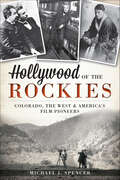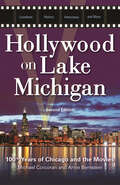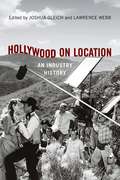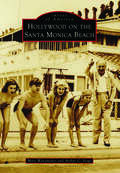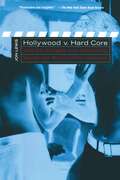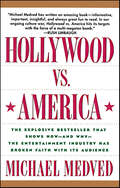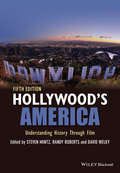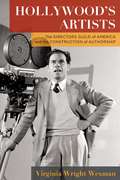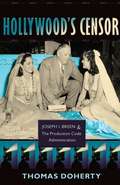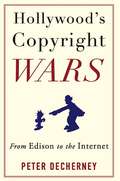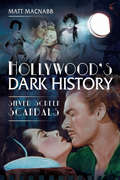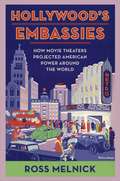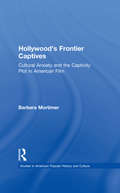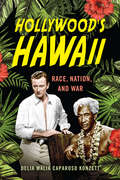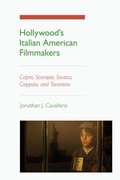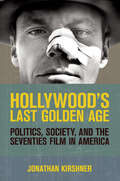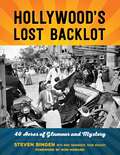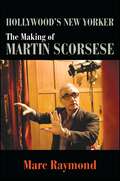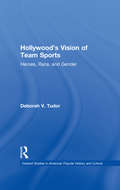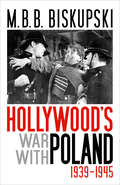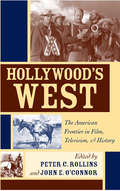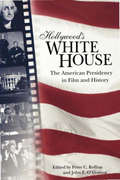- Table View
- List View
Hollywood in the Sixties
by John BaxterHollywood in the 1960s is not truly Hollywood, but a factory whose product lacks the magic of earlier decades. Perhaps some magic will accrue over the years, but once we are aware of its mechanics will the alchemy continue to work? Like the cartoon characters, we remain suspended in the air only as long as we are unaware of being so; as soon as we look down, we fall.
Hollywood of the Rockies: Colorado, the West and America's Film Pioneers
by Michael J. SpencerIn the early days of the twentieth century, movies weren't made in California. As America's film pioneers traveled westward, Colorado became a beacon to them, contributing to the early motion picture business with all the relish and gusto of a western saga. The gorgeous natural scenery was perfect for the country's (and the world's) growing infatuation with the West, turning Colorado itself into a bigger star of the early cinema than any particular actor. Using rare photos and contemporary accounts, writer and filmmaker Michael J. Spencer explores the little-known filmmaking industry that flourished in the Rocky Mountains between 1895 and 1915--west of New York but east of Hollywood.
Hollywood on Lake Michigan: 100+ Years of Chicago and the Movies
by Michael Corcoran Arnie BernsteinRanging from the dawn of the silent era to today's blockbusters and independent films, this revamped second edition chronicles the significant contributions by Chicago and Chicagoans to more than a century of American filmmaking. Among the Windy City's unique honors in this history are the development of film technology by early major players Essanay Film Manufacturing Company and the Selig Polyscope Company; the first African American-owned and operated film studios; the birthplace of gore flicks; the origination and growth of movie palaces; and the importance of the Second City, Goodman, and Steppenwolf theaters as training grounds for the industry's best comedic and dramatic talent. Readers will relish behind-the-scenes stories of local favorites like The Blues Brothers and Ferris Bueller's Day Off, as well as recent box office smashes like Batman Begins and The Dark Knight. Fully revised and updated, this premier guide to the Windy City's history in the film industry features new profiles of film locations, more photographs, and exclusive interviews detailing all aspects of the moviemaking process, making it the perfect guide for film lovers and Chicago history buffs alike.
Hollywood on Location: An Industry History
by Julian Stringer Daniel Steinhart Sheri Chinen Biesen Jennifer Lynn Peterson Noelle GriffisLocation shooting has always been a vital counterpart to soundstage production, and at times, the primary form of Hollywood filmmaking. But until now, the industrial and artistic development of this production practice has been scattered across the margins of larger American film histories. Hollywood on Location is the first comprehensive history of location shooting in the American film industry, showing how this mode of filmmaking changed Hollywood business practices, production strategies, and visual style from the silent era to the present. The contributors explore how location filmmaking supplemented and later, supplanted production on the studio lots. Drawing on archival research and in-depth case studies, the seven contributors show how location shooting expanded the geography of American film production, from city streets and rural landscapes to far-flung territories overseas, invoking a new set of creative, financial, technical, and logistical challenges. Whereas studio filmmaking sought to recreate nature, location shooting sought to master it, finding new production values and production economies that reshaped Hollywood’s modus operandi.
Hollywood on the Santa Monica Beach (Images of America)
by Arthur C. Verge Marc WanamakerSince pioneer filmmakers arrived on its shoreline in the early 20th century, the Santa Monica beach has been a popular location for the making of movies and television productions. Its enchanting beauty led studio moguls, producers, and celebrities to build beach houses there, creating what became known as "Hollywood's Playground." The sand and shore of the Santa Monica beach became a favored site for the likes of Charlie Chaplin, Marion Davies, William Randolph Hearst, and Cary Grant. It was on this beach that the Academy Awards were conceived, the movie The Wizard of Oz sprang forth, and a young Pres. John F. Kennedy stunned beachgoers with a surprise ocean swim without the protection of Secret Service agents. In 1962, the beach became the center of the universe as the site of President Kennedy's "Western White House," where the visitors included Frank Sinatra, Dean Martin, Sammy Davis Jr., Marilyn Monroe, and--famously--"anyone who was anyone."
Hollywood v. Hard Core: How the Struggle Over Censorship Created the Modern Film Industry
by Jon LewisA tale of censorship and regulation at the heart of the modern film industryIn 1972, The Godfather and Deep Throat were the two most popular films in the country. One, a major Hollywood studio production, the other an independently made "skin flick." At that moment, Jon Lewis asserts, the fate of the American film industry hung in the balance.Spanning the 20th century, Hollywood v. Hard Core weaves a gripping tale of censorship and regulation. Since the industry's infancy, film producers and distributors have publicly regarded ratings codes as a necessary evil. Hollywood regulates itself, we have been told, to prevent the government from doing it for them. But Lewis argues that the studios self-regulate because they are convinced it is good for business, and that censorship codes and regulations are a crucial part of what binds the various competing agencies in the film business together. Yet between 1968 and 1973 Hollywood films were faltering at the box office, and the major studios were in deep trouble. Hollywood's principal competition came from a body of independently produced and distributed films—from foreign art house film Last Tango in Paris to hard-core pornography like Behind the Green Door—that were at once disreputable and, for a moment at least, irresistible, even chic. In response, Hollywood imposed the industry-wide MPAA film rating system (the origins of the G, PG, and R designations we have today) that pushed sexually explicit films outside the mainstream, and a series of Supreme Court decisions all but outlawed the theatrical exhibition of hard core pornographic films. Together, these events allowed Hollywood to consolidate its iron grip over what films got made and where they were shown, thus saving it from financial ruin.
Hollywood vs. America: The Explosive Bestseller that Shows How—and Why—the Entertainment Industry has Broken Faith with Its Audience
by Michael MedvedWhy does our popular culture seem so consistently hostile to the values that most Americans hold dear? Why does the entertainment industry attack religion, glorify brutality, undermine the family, and deride patriotism? In this explosive book, one of the nation's best known film critics examines how Hollywood has broken faith with its public, creating movies, television, and popular music that exacerbate every serious social problem we face, from teenage pregnancies to violence in the streets. Michael Medved powerfully argues that the entertainment business follows its own dark obsessions, rather than giving the public what it wants: In fact, the audience for feature films and network television has demonstrated its profound disillusionment in recent years, with disastrous consequences for many entertainment companies. Meanwhile, overwhelming numbers of our fellow citizens complain about the wretched quality of our popular culture--describing the offerings of the mass media as the worst ever. Medved asserts that Hollywood ignores--and assaults--the values of ordinary American families, pursuing a self-destructive and alienated ideological agenda that is harmful to the nation at large and to the industry's own interests. In hard-hitting chapters on "The Attack on Religion," "The Addiction to Violence," "Promoting Promiscuity," "The Infatuation with Foul Language," "Kids Know Best," "Motivations for Madness," and other subjects, Medved outlines the underlying themes that turn up again and again in our popular culture. He also offers conclusive evidence of the frightening real-world impact of these messages on our society and our children. Finally, Medved shows where and how Hollywood took a disastrous wrong turn toward its current crisis, and he outlines promising efforts both in and outside the industry to restore a measure of sanity and restraint to our media of mass entertainment.Sure to elicit strong response, whether it takes the form of cheers of support or howls of enraged dissent, Hollywood vs. America confronts head-on one of the most significant issues of our times.
Hollywood's America: Understanding History Through Film
by Steven Mintz Randy W. Roberts David WelkyFully revised, updated, and extended, the fifth edition of Hollywood’s America provides an important compilation of interpretive essays and primary documents that allows students to read films as cultural artifacts within the contexts of actual past events. A new edition of this classic textbook, which ties movies into the broader narrative of US and film history This fifth edition contains nine new chapters, with a greater overall emphasis on recent film history, and new primary source documents which are unavailable online Entries range from the first experiments with motion pictures all the way to the present day Well-organized within a chronological framework with thematic treatments to provide a valuable resource for students of the history of American film
Hollywood's Artists: The Directors Guild of America and the Construction of Authorship (Film and Culture Series)
by Virginia Wright WexmanToday, the director is considered the leading artistic force behind a film. The production of a Hollywood movie requires the labor of many people, from screenwriters and editors to cinematographers and boom operators, but the director as author of the film overshadows them all. How did this concept of the director become so deeply ingrained in our understanding of cinema?In Hollywood’s Artists, Virginia Wright Wexman offers a groundbreaking history of how movie directors became cinematic auteurs that reveals and pinpoints the influence of the Directors Guild of America (DGA). Guided by Frank Capra’s mantra “one man, one film,” the Guild has portrayed its director-members as the creators responsible for turning Hollywood entertainment into cinematic art. Wexman details how the DGA differentiated itself from other industry unions, focusing on issues of status and creative control as opposed to bread-and-butter concerns like wages and working conditions. She also traces the Guild’s struggle for creative and legal power, exploring subjects from the language of on-screen credits to the House Un-American Activities Committee’s investigations of the movie industry. Wexman emphasizes the gendered nature of images of the great director, demonstrating how the DGA promoted the idea of the director as a masculine hero. Drawing on a broad array of archival sources, interviews, and theoretical and sociological insight, Hollywood’s Artists sheds new light on the ways in which the Directors Guild of America has shaped the role and image of directors both within the Hollywood system and in the culture at large.
Hollywood's Censor: Joseph I. Breen and the Production Code Administration
by Thomas DohertyThe story of the man who made Hollywood moral.
Hollywood's Censor: Joseph I. Breen and the Production Code Administration
by Thomas DohertyFrom 1934 to 1954 Joseph I. Breen, a media-savvy Victorian Irishman, reigned over the Production Code Administration, the Hollywood office tasked with censoring the American screen. Though little known outside the ranks of the studio system, this former journalist and public relations agent was one of the most powerful men in the motion picture industry. As enforcer of the puritanical Production Code, Breen dictated "final cut" over more movies than anyone in the history of American cinema. His editorial decisions profoundly influenced the images and values projected by Hollywood during the Great Depression, World War II, and the Cold War. Cultural historian Thomas Doherty tells the absorbing story of Breen's ascent to power and the widespread effects of his reign. Breen vetted story lines, blue-penciled dialogue, and excised footage (a process that came to be known as "Breening") to fit the demands of his strict moral framework. Empowered by industry insiders and millions of like-minded Catholics who supported his missionary zeal, Breen strove to protect innocent souls from the temptations beckoning from the motion picture screen. There were few elements of cinematic production beyond Breen's reach-he oversaw the editing of A-list feature films, low-budget B movies, short subjects, previews of coming attractions, and even cartoons. Populated by a colorful cast of characters, including Catholic priests, Jewish moguls, visionary auteurs, hardnosed journalists, and bluenose agitators, Doherty's insightful, behind-the-scenes portrait brings a tumultuous era-and an individual both feared and admired-to vivid life.
Hollywood's Copyright Wars: From Edison to the Internet
by Peter DecherneyCopyright law is important to every stage of media production and reception. It helps determine filmmakers' artistic decisions, Hollywood's corporate structure, and the vatieties of media consumption. The rise of digital media and the internet has only expanded copyright's reach. Everyone from producers and sceenwriters to amateur video makers, file sharers, and internet entrepreneurs has a stake in the history and future of piracy, copy protection, and the public domain.
Hollywood's Dark History: Silver Screen Scandals
by Matt MacNabbThirteen sensational tales of sex, lies, violence, and murder from the early decades of Hollywood.The dawning of the nineteenth century brought with it a new era for entertainment. Vaudeville was the preferred form of entertainment, until the popularization of the silent film. This new medium proved to be a draw for many of the stars of the Vaudevillian stage and soon they migrated to the exciting possibilities that the movies had to offer. Audiences were instantly captivated by the stars of the silent screen. The early days of Hollywood were full of glamour and a newfound decadence. The stars in these films were catapulted to fame and fortune and the spotlight of the public eye. But the real people behind the glamour were far different from the characters that audiences knew and loved, and much like Hollywood today, the lives of the stars were often full of scandal and debauchery.This book examines the forgotten scandals of Hollywood’s early years, featuring silent and silver screen stars like Jean Harlow, Mae West, Mary Pickford, Charlie Chaplin, and Errol Flynn. Don’t let the romanticized black and white world of yesterday fool you. Their stories are rife with sex, drugs, and murder.
Hollywood's Dirtiest Secret: The Hidden Environmental Costs of the Movies (Film and Culture Series)
by Hunter VaughanIn an era when many businesses have come under scrutiny for their environmental impact, the film industry has for the most part escaped criticism and regulation. Its practices are more diffuse; its final product, less tangible; and Hollywood has adopted public-relations strategies that portray it as environmentally conscious. In Hollywood’s Dirtiest Secret, Hunter Vaughan offers a new history of the movies from an environmental perspective, arguing that how we make and consume films has serious ecological consequences.Bringing together environmental humanities, science communication, and social ethics, Hollywood’s Dirtiest Secret is a pathbreaking consideration of the film industry’s environmental impact that examines how our cultural prioritization of spectacle has distracted us from its material consequences and natural-resource use. Vaughan examines the environmental effects of filmmaking from Hollywood classics to the digital era, considering how popular screen media shapes and reflects our understanding of the natural world. He recounts the production histories of major blockbusters—Gone with the Wind, Singin’ in the Rain, Twister, and Avatar—situating them in the contexts of the development of the film industry, popular environmentalism, and the proliferation of digital technologies. Emphasizing the materiality of media, Vaughan interweaves details of the hidden environmental consequences of specific filmmaking practices, from water use to server farms, within a larger critical portrait of social perceptions and valuations of the natural world.
Hollywood's Embassies: How Movie Theaters Projected American Power Around the World (Film and Culture Series)
by Ross MelnickBeginning in the 1920s, audiences around the globe were seduced not only by Hollywood films but also by lavish movie theaters that were owned and operated by the major American film companies. These theaters aimed to provide a quintessentially “American” experience. Outfitted with American technology and accoutrements, they allowed local audiences to watch American films in an American-owned cinema in a distinctly American way.In a history that stretches from Buenos Aires and Tokyo to Johannesburg and Cairo, Ross Melnick considers these movie houses as cultural embassies. He examines how the exhibition of Hollywood films became a constant flow of political and consumerist messaging, selling American ideas, products, and power, especially during fractious eras. Melnick demonstrates that while Hollywood’s marketing of luxury and consumption often struck a chord with local audiences, it was also frequently tone-deaf to new social, cultural, racial, and political movements. He argues that the story of Hollywood’s global cinemas is not a simple narrative of cultural and industrial indoctrination and colonization. Instead, it is one of negotiation, booms and busts, successes and failures, adoptions and rejections, and a precursor to later conflicts over the spread of American consumer culture. A truly global account, Hollywood’s Embassies shows how the entanglement of worldwide movie theaters with American empire offers a new way of understanding film history and the history of U.S. soft power.
Hollywood's Frontier Captives: Cultural Anxiety and the Captivity Plot in American Film (Studies in American Popular History and Culture)
by Barbara A. MortimerThe captivity narrative, the earliest genre of American popular literature, continues to be of cultural significance in late 20th-century Hollywood. Many popular films of the last four decades incorporate the most common elements of the captivity narrative tradition, including a politically contested frontier setting and a plot involving innocent, family-oriented white Americans held captive by hostile, culturally alien natives. At the same time, these films offer something new to the narrative tradition: they focus on the captive who resists rescue and the challenge this resistance poses to American cultural self-confidence. By focusing on the lost captive, these films, beginning with The Searchers (1956), deal with questions about American identity raised by a white American's cultural and potentially political transformation. Films as diverse as Little Big Man, Taxi Driver, and The Deer Hunter adapted the captivity narrative's conventions to criticize aspects of contemporary American society and reject outworn models of male heroism; at the same time, however, they retained the genre's traditional assumption of white superiority and its fear of female sexuality. Bibliography. Index.
Hollywood's Hawaii: Race, Nation, and War
by Delia Malia KonzettWhether presented as exotic fantasy, a strategic location during World War II, or a site combining postwar leisure with military culture, Hawaii and the South Pacific figure prominently in the U.S. national imagination. Hollywood’s Hawaii is the first full-length study of the film industry’s intense engagement with the Pacific region from 1898 to the present. Delia Malia Caparoso Konzett highlights films that mirror the cultural and political climate of the country over more than a century—from the era of U.S. imperialism on through Jim Crow racial segregation, the attack on Pearl Harbor and WWII, the civil rights movement, the contemporary articulation of consumer and leisure culture, as well as the buildup of the modern military industrial complex. Focusing on important cultural questions pertaining to race, nationhood, and war, Konzett offers a unique view of Hollywood film history produced about the national periphery for mainland U.S. audiences. Hollywood’s Hawaii presents a history of cinema that examines Hawaii and the Pacific and its representations in film in the context of colonialism, war, Orientalism, occupation, military buildup, and entertainment.
Hollywood's Italian American Filmmakers: Capra, Scorsese, Savoca, Coppola, and Tarantino
by Jonathan J. CavalleroHollywood's Italian American Filmmakers explores the different ways in which Italian American directors from the 1920s to the present have responded to their ethnicity. While some directors have used film to declare their ethnic roots and create an Italian American "imagined community," others have ignored or even denied their background. Jonathan J. Cavallero examines the films of Frank Capra, Martin Scorsese, Nancy Savoca, Francis Ford Coppola, and Quentin Tarantino with a focus on what the films reveal about each director's view on Italian American identities. Whereas Capra's films highlight similarities between immigrant characters and WASP Americans, Scorsese accepts his ethnic heritage but also sees it as confining. Similarly, many of Coppola's films provide a nostalgic treatment of Italian American identity, but with little criticism of the culture's more negative aspects. And while Savoca's movies reveal her artful ability to recognize how ethnic, gender, and class identities overlap, Tarantino's films exhibit a playfully postmodern engagement with Italian American ethnicity. Cavallero's exploration of the films of Capra, Scorsese, Savoca, Coppola, and Tarantino demonstrates how immigrant Italians fought prejudice, how later generations positioned themselves in relation to their predecessors, and how the American cinema, usually seen as a cultural institution that works to assimilate, has also served as a forum where assimilation was resisted.
Hollywood's Last Golden Age: Politics, Society, and the Seventies Film in America
by Jonathan KirshnerBetween 1967 and 1976 a number of extraordinary factors converged to produce an uncommonly adventurous era in the history of American film. The end of censorship, the decline of the studio system, economic changes in the industry, and demographic shifts among audiences, filmmakers, and critics created an unprecedented opportunity for a new type of Hollywood movie, one that Jonathan Kirshner identifies as the "seventies film." In Hollywood's Last Golden Age, Kirshner shows the ways in which key films from this period-including Chinatown, Five Easy Pieces, The Graduate, and Nashville, as well as underappreciated films such as The Friends of Eddie Coyle, Klute, and Night Moves-were important works of art in continuous dialogue with the political, social, personal, and philosophical issues of their times.These "seventies films" reflected the era's social and political upheavals: the civil rights movement, the domestic consequences of the Vietnam war, the sexual revolution, women's liberation, the end of the long postwar economic boom, the Shakespearean saga of the Nixon Administration and Watergate. Hollywood films, in this brief, exceptional moment, embraced a new aesthetic and a new approach to storytelling, creating self-consciously gritty, character-driven explorations of moral and narrative ambiguity. Although the rise of the blockbuster in the second half of the 1970s largely ended Hollywood's embrace of more challenging films, Kirshner argues that seventies filmmakers showed that it was possible to combine commercial entertainment with serious explorations of politics, society, and characters' interior lives.
Hollywood's Lost Backlot: 40 Acres of Glamour and Mystery
by Steven BingenHollywood is a transitory place. Stars and studios rise and fall. Genres and careers wax and wane. Movies and movie moguls and movie makers and movie palaces are acclaimed and patronized and loved and beloved, and then forgotten. And yet…And yet one place in Southern California, built in the 1920s by (allegedly murdered) producer Thomas Ince, acquired by Cecil B. DeMille, now occupied by Amazon.com, has been the home for hundreds of the most iconic and legendary films and television shows in the world for a remarkable and star-studded fifty years. This bizarre, magical place was the location for Tara in Gone with The Wind, the home of King Kong and Superman, of Tarzan and Batman, of the Green Hornet, of Elliot Ness, of Barney Fife, of Tarzan, of Rebecca, of Citizen Kane, of Hogan&’s Heroes and Gomer Pyle, of Lasse, of A Star is Born and Star Trek, and at least twice, of Jesus Christ. For decades, every conceivable star in Hollywood, from Clark Gable to Warren Beatty, worked and loved and gave indelible performances on the site. And yet, today, it is completely forgotten.Pretty much anyone alive today, from college professors to longshoremen, have probably heard of Paramount and of MGM, of Warner Bros. and of Universal, and of Disney and Fox and Columbia, but the place where many of these studio&’s beloved classics were minted is today as mysterious and unknowable as the sphinx.Hollywood&’s Lost Backlot: 40 Acres of Glamour and Mystery will, for the first time ever, unwind the colorful and convoluted threads that make for the tale of one of the most influential and photographed places in the world. A place which most have visited, at least on screen, and which has contributed significantly and unexpectedly to the world&’s popular culture, and yet which few people today, paradoxically, have ever heard of.
Hollywood's New Yorker: The Making of Martin Scorsese (SUNY series, Horizons of Cinema)
by Marc RaymondWhen Martin Scorsese finally won an Academy Award in 2007, for The Departed, it was widely viewed as the crowning achievement of a remarkable film career. But what it also represented was an acceptance by Hollywood of a man who became a prestigious auteur precisely because of his status as an outsider from New York. For someone with a high-culture reputation like Scorsese's, this middlebrow sign of respectability was not about cultural standing; rather, it was about using and even sacrificing his distinctive outsider status for a greater share of industry authority within the world of Hollywood.In Hollywood's New Yorker, Marc Raymond offers a fresh look at Scorsese's career in relation to the critical and social environment of the past fifty years. He traces Scorsese's career and films through his association with various cultural institutions, from his role as a student and instructor at New York University, to his move to Hollywood and his relationship with the studio system, to his relationship with prestigious institutions like the Museum of Modern Art. This sociological approach to film authorship provides analysis of previously overlooked Scorsese projects, particularly his documentary work, and gives importance to the role his extracurricular activities in the film preservation movement have played in the rise of his reputation.Hollywood's New Yorker places Scorsese and his films firmly within the various time periods of his career and compares the director with his peers, from fellow New Yorkers like Brian De Palma and Woody Allen to New Hollywood movie brats such as Francis Ford Coppola and Steven Spielberg. The result is a complete picture of Scorsese and the post–World War II American film culture he has both shaped and been shaped by.
Hollywood's Vision of Team Sports: Heroes, Race, and Gender (Studies in American Popular History and Culture)
by Deborah V. TudorThis book analyzes the ways in which sport reflects, imitates, and questions cultural values. It examines the representation of team sports, heroes, race, families, and gender in films and other media. Analysis of the ways in which broadcast media and films create such images allows us to map the ways in which traditional cultural beliefs and practices resist and accommodate changes. Films about sport do not reproduce a simple, unified set of values-rather, they exhibit the complications of attempting to negotiate ideological contradictions. During the last 50 years, sports films have shifted from the heroic idealization of The Babe Ruth Story (1948) to films revealing complexities, controversies, and uncertainties within the sports world, like Everybody's All American (1988). These contradictions are especially strong in the areas of race and gender, which are related major changes in the traditional notion of the hero. The book traces the transformation of the image of the hero in sports films within the context of the development of the sports celebrity, epitomized by Michael Jordan.
Hollywood's War with Poland, 1939–1945
by M.B.B. Biskupski&“This passionate, carefully researched, richly detailed, well-written study&” reveals the political motives behind WWII Hollywood&’s portrayal of Poles (Choice). During World War II, Hollywood studios supported the war effort by making patriotic movies designed to raise the nation's morale. Often the characterizations were as black and white as the movies themselves: Americans and their allies were heroes, while everyone else was a villain. The peoples of Norway, France, Czechoslovakia, and England were all good because they had been invaded or victimized by Nazi Germany. Yet Poland—the first country to be invaded by the Third Reich—was repeatedly represented in a negative light. In this prize-winning study, Polish historian M. B. B. Biskupski explores why. Biskupski presents a close critical study of prewar and wartime films such as To Be or Not to Be, In Our Time, and None Shall Escape. Through memoirs, letters, diaries, and memoranda written by screenwriters, directors, studio heads, and actors, Biskupski examines how the political climate, and especially pro-Soviet sentiment, influenced Hollywood films of the time. Winner of the Oscar Halecki PrizeA Choice Outstanding Academic Title
Hollywood's West: The American Frontier in Film, Television, & History
by Peter C. Rollins and John E. O’Connor&“An excellent study that should interest film buffs, academics, and non-academics alike&” (Journal of the West). Hollywood&’s West examines popular perceptions of the frontier as a defining feature of American identity and history. Seventeen essays by prominent film scholars illuminate the allure of life on the edge of civilization and analyze how this region has been represented on big and small screens. Differing characterizations of the frontier in modern popular culture reveal numerous truths about American consciousness and provide insights into many classic Western films and television programs, from RKO&’s 1931 classic Cimarron to Turner Network Television&’s recent made-for-TV movies. Covering topics such as the portrayal of race, women, myth, and nostalgia, Hollywood&’s West makes a significant contribution to the understanding of how Westerns have shaped our nation&’s opinions and beliefs—often using the frontier as metaphor for contemporary issues.
Hollywood's White House: The American Presidency in Film and History
by Peter C. Rollins and John E. O’ConnorFrom action flicks to biopics to SNL skits, how presidents are portrayed on screen: &“An interesting study of the real presidency and the reel presidency.&” —USA Today Magazine Winner of the Popular Culture Association&’s Ray and Pat Browne Book Award Whether serious or satirical, biographical or fictional, the ways that US presidents are depicted in popular culture reveal much about us as a nation. The contributors to Hollywood&’s White House examine the historical accuracy of presidential depictions, illuminate their influence, and uncover how they reflect the concerns of their times and the social and political visions of the filmmakers. With reflections on portrayals of Washington, Adams, Lincoln, FDR, Nixon, and more, this volume, which includes a comprehensive filmography and a bibliography, is ideal for both historians and film enthusiasts. &“An engaging collection.&” —Robert Brent Toplin, author of Reel History: In Defense of Hollywood

